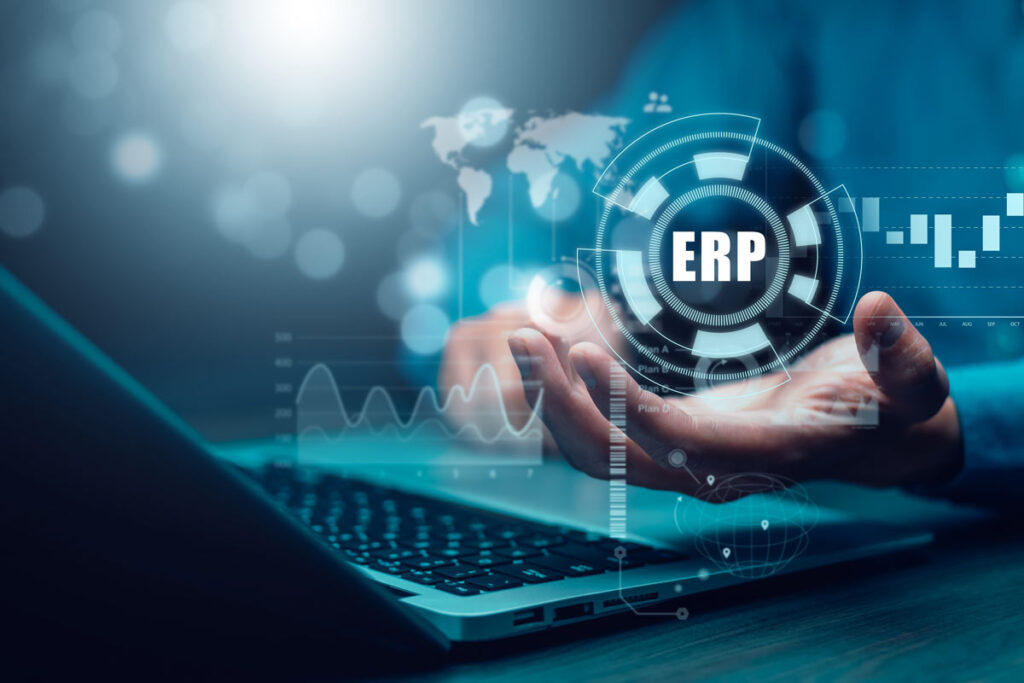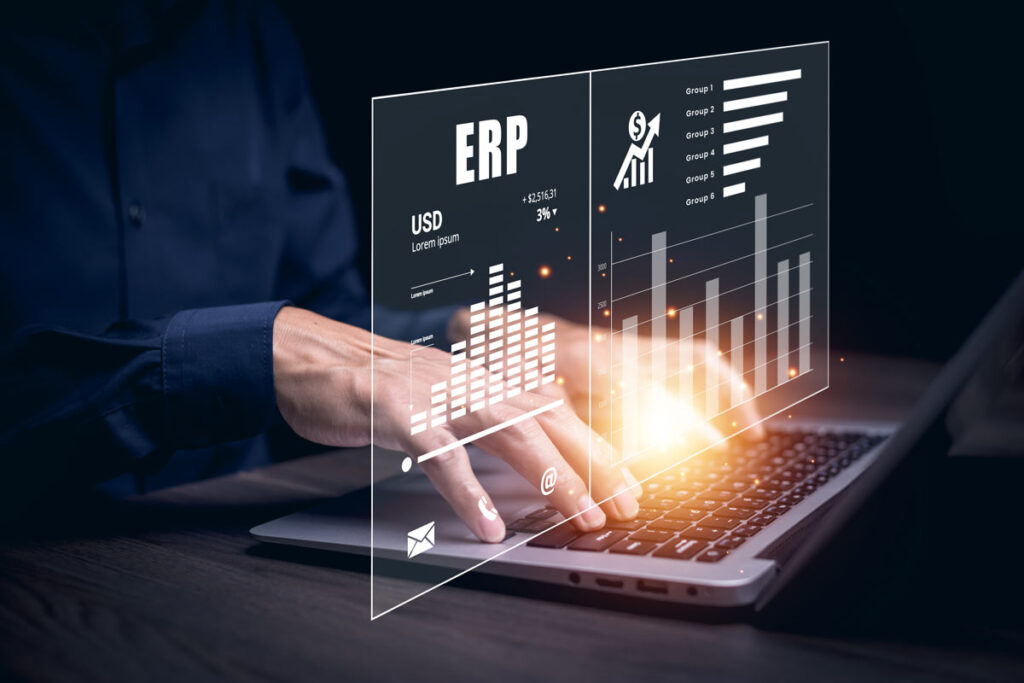
Enterprise Resource Planning (ERP) is a powerful tool that helps businesses organize, manage, and integrate their core functions. From inventory management to financial reports and human resource tracking, ERP can support a company’s operations across various departments, providing a single source of truth for real-time data and decision-making. In this guide, we’ll break down what an ERP system is, how it works, and why it’s so valuable for businesses today.
What is an ERP System?
So, what is ERP software exactly? ERP, or Enterprise Resource Planning, is a management system that integrates and automates essential business processes. Think of ERP as the central nervous system of an organization—it brings together various functions, so everything operates in sync. For example, an ERP can handle accounts payable, track inventory management, and even provide business intelligence insights, all in one place.
ERP software helps eliminate data silos, where information gets trapped within specific departments. Instead, data flows across the organization, providing a comprehensive view of business operations. The system’s integration allows different departments, from finance to human resources, to access real-time information, streamline processes, and make informed decisions.
How Does ERP Work?
ERP systems work by using a unified platform that connects all business functions. Each area of the company has its own ERP modules—for instance, financial management handles accounting, while customer relationship management (CRM) manages customer data. These modules work together, feeding into a single database to provide a complete view of the business.
To further explain how ERP systems work, let’s break down the main components:
- Centralized Database: All information is stored in a single place, making it easy for various departments to access up-to-date information.
- Real-Time Information: ERP provides real-time insights, allowing companies to make quick and accurate decisions.
- Process Automation: Tasks like generating purchase orders, managing warehouse operations, and tracking raw materials are automated, saving time and reducing errors.
- ERP Modules: Each module addresses a specific area of the business, such as project management, accounts payable, or material requirements planning (MRP), creating a fully integrated system.
ERP systems work on the principle of integration. By allowing departments to share information, ERP can optimize workflows and increase efficiency across the company.
Key ERP Modules and Functions
An ERP enterprise resource planning system includes various modules tailored to specific business functions. While each ERP system might have unique features, some core modules are present in nearly every system.
Financial Management
Financial management is at the heart of most ERP systems. This module helps track all accounting transactions, from accounts payable to payroll. It can also generate financial reports, provide insight into budgeting, and support compliance with financial regulations.
Human Resource (HR)
ERP systems often include an HR module, which simplifies employee-related tasks such as recruiting, payroll, and performance tracking. It also offers tools for managing employee benefits, time-off requests, and compliance issues.
Inventory Management and Warehouse Management
Keeping track of inventory and raw materials is crucial for businesses, especially in manufacturing and retail. The inventory management module provides real-time data on stock levels, reordering needs, and location tracking. When paired with warehouse management, it allows for efficient stock handling, ensuring the right products are available when needed.
Customer Relationship Management (CRM)
A CRM module focuses on managing and improving relationships with customers. It helps track customer information, past interactions, and purchase history, enabling businesses to offer personalized services. CRM within an ERP system also supports order management and can even help with marketing efforts.
Project Management
In industries like construction, consulting, or engineering, project management is vital. The project management module in ERP keeps track of project deadlines, resources, and budgets. It ensures that projects stay on schedule and within budget, offering real-time updates and reports.
Material Requirements Planning (MRP)
Manufacturing companies often rely on MRP to streamline production processes. This module helps plan for necessary raw materials based on upcoming orders, ensuring that materials are available, and production deadlines are met.

Benefits of ERP
Now that we’ve covered what ERP software is and how it works, let’s dive into some of the benefits ERP brings to a business.
1. Streamlined Operations
ERP software automates and integrates processes, making day-to-day operations smoother and more efficient. With everything from inventory management to financial reports housed in one system, ERP eliminates the need for multiple disconnected systems, saving time and reducing errors.
2. Enhanced Data Accuracy and Single Source of Truth
With ERP, all business information is in a single source of truth—one centralized database. This keeps data accurate and up to date, allowing teams to rely on real-time data for decision-making. From purchase orders to accounts payable, ERP’s centralized data makes reporting accurate and easy.
3. Improved Customer Relationships
The CRM module in ERP systems enables companies to deliver better customer experiences. By tracking customer interactions and managing data in one place, businesses can provide faster responses, personalized services, and consistent communication. This leads to better customer satisfaction and retention.
4. Cost Reduction
ERP systems can help reduce costs by optimizing resource use, automating repetitive tasks, and minimizing waste. With better inventory control, efficient use of raw materials, and accurate financial tracking, companies can save money and improve their bottom line.
5. Better Decision-Making with Business Intelligence
ERP software provides powerful business intelligence tools that allow managers to analyze data and make informed decisions. These insights can help identify trends, uncover opportunities for growth, and improve overall performance.
ERP Implementation: Deployment Options
Implementing an ERP system is a significant project that requires careful planning. Companies can choose from several deployment options, including:
- On-Premises ERP: Installed and maintained directly on a company’s servers. Offers full control but requires significant IT resources.
- Cloud ERP: Hosted on the vendor’s cloud, offering flexibility and lower upfront costs. Ideal for companies looking for scalability.
- Hybrid ERP: Combines both on-premises and cloud-based solutions, offering a balance between control and flexibility.
Selecting the right deployment option depends on the company’s size, budget, and specific needs.
Choosing the Right ERP Vendor
With so many ERP vendors available, finding the right one can be challenging. Companies should evaluate vendors based on their industry experience, module offerings, and customization capabilities. The right ERP vendor will offer tailored solutions, support for ERP implementation, and post-installation support.
Some top ERP vendors include SAP, Oracle, and Microsoft Dynamics, each providing unique features and benefits for different business types. Assessing your specific requirements, such as inventory management or financial management, will help narrow down the best fit.
The Bottom Line
In a world where accurate information and efficient processes are crucial, Enterprise Resource Planning systems offer businesses a powerful tool for success. By integrating critical functions like order management, project management, and customer relationship management, ERP software provides a comprehensive solution that enhances efficiency and reduces costs. With real-time information at your fingertips, ERP systems enable better decision-making and smoother operations.
If you’re considering an ERP, remember to take the time to understand your specific needs and explore the deployment options that best fit your business. ERP may be a significant investment, but when implemented correctly, it can transform how your business operates, providing benefits that extend across departments and setting you up for long-term success.
